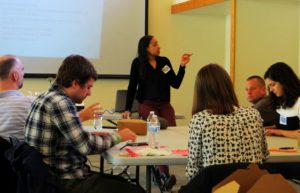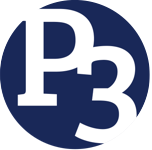
Community Engagement
We believe the best decisions are made when the most voices are heard. To fulfill this mission, we employ every tool we can to make sure equitable engagement is attainable and sustainable in every project and woven into the fabric of each public engagement strategy.
By gathering community perspectives and utilizing these perspectives in decision-making, projects are more likely to have community buy-in and succeed.
We work with state and local governments, planning and engineering firms, and non-profits to conduct outreach to area stakeholders, reach harder-to-reach populations through innovative methods, and provide the public with comprehensible information.
P3 begins every project with the development of an internal public engagement plan in close coordination with the agency and other consultants.
The public engagement plan helps provide a big picture view of the community engagement needed to successfully engage the public and gather input. This foundation not only provides accountability to the project team, but also helps facilitate equitable engagement.
The public engagement plan helps provide a big picture view of the community engagement needed to successfully engage the public and gather input. This foundation not only provides accountability to the project team, but also helps facilitate equitable engagement.
We work with agencies and project teams to identify outreach goals and develop a data-driven outreach approach.
Our public and stakeholder outreach strategies are based on a comprehensive analysis of the project area’s demographics. We are always striving to reach not only as many people as possible, but also a group that is representative of the demographic study area.
Stakeholders are an important part of fulfilling this mission. By doing extensive research on the project area, we develop a comprehensive stakeholder database that can be used and added to throughout the project. Our goal in stakeholder outreach is to provide these groups with important project information, ask for their assistance in reaching their members, and build lasting relationships.
Learn more about our multi-faceted approach by visiting our Equitable Outreach services page.
Our public and stakeholder outreach strategies are based on a comprehensive analysis of the project area’s demographics. We are always striving to reach not only as many people as possible, but also a group that is representative of the demographic study area.
Stakeholders are an important part of fulfilling this mission. By doing extensive research on the project area, we develop a comprehensive stakeholder database that can be used and added to throughout the project. Our goal in stakeholder outreach is to provide these groups with important project information, ask for their assistance in reaching their members, and build lasting relationships.
Learn more about our multi-faceted approach by visiting our Equitable Outreach services page.
Meeting Logistics
When planning meeting logistics, we take into consideration the requirements not only of the project team, but also of the community the project is seeking to reach. We recognize that meetings are often more successful when hosted in an ADA compliant location within the project area itself. We also take time, transportation, parking, childcare, refreshments, and more into consideration in order to make in-person meetings as accessible as possible.Meeting Materials
Our team is equipped to compose, design, and distribute meeting materials that are easy-to-understand and cover the necessary information to educate residents about the project.Whenever possible, we use visualizations to illustrate technical terminology and ideas to help make the materials more comprehensible.
Our capacity for developing meeting materials includes, but is not limited to:
- Presentations
- Open house boards
- Handouts
- Paper surveys and comment forms
- Activities, such as comment collection displays or interactive maps
Meeting Notifications
Messaging is an important part of getting people to participate in your public engagement process. Our approach to communications and meeting notifications is tailored to your project’s audience.We take into consideration what methods would best reach area residents, as well as what impact the messages themselves will have. This includes creating a plan for equitable outreach to communicate with those individuals who have been historically excluded from the conversation.
 Whether your project requires a large presentation-style meeting or small group interactions, our P3 staff is prepared. Trained in meeting facilitation and experienced in navigating group dynamics, P3 conducts every meeting with the same skills:
Whether your project requires a large presentation-style meeting or small group interactions, our P3 staff is prepared. Trained in meeting facilitation and experienced in navigating group dynamics, P3 conducts every meeting with the same skills:- Active listening: Being in the moment and listening for understanding.
- Asking questions for clarification: Never just assuming what a participant means, but asking for more details or restating what we heard for confirmation.
- Transparent note-taking: When public input is being collected, we make sure to take notes in a way that is visible to participants or available to them for review.
- Conflict mitigation: Some projects can create high public emotions. We take the steps necessary to prevent, recognize, identify, and respond to those emotions to create understanding amongst all parties.
Closing the feedback loop is not only an important part of creating transparency in a project, but also can be required for federal funding and for other regulatory purposes. P3 has the knowledge, tools, and experience to ensure project compliance with Title VI and National Environmental Policy Act (NEPA) requirements.
After each engagement activity, P3 composes a meeting and comment summary that can be used for Title VI and NEPA documentation. However, we also always recommend posting it publicly on a website and sending it through email to subscribers. Relaying the public’s input and detailing how that input influenced decisions helps build trust in the project team and agency.
P3 also compiles public outreach summaries for Title VI and NEPA documentation that include details about the type, amount, and outcome of public outreach efforts.
After each engagement activity, P3 composes a meeting and comment summary that can be used for Title VI and NEPA documentation. However, we also always recommend posting it publicly on a website and sending it through email to subscribers. Relaying the public’s input and detailing how that input influenced decisions helps build trust in the project team and agency.
P3 also compiles public outreach summaries for Title VI and NEPA documentation that include details about the type, amount, and outcome of public outreach efforts.
Often, projects are met with community apprehension and controversy. This might be because of past experiences or concerns over future outcomes. Unfortunately, when not addressed properly, these conflicts can lead to project delays and unsuccessful outcomes.
P3 has extensive experience working with agencies and communities to mitigate and resolve conflicts while also building consensus among all parties.
How do we do it?
We often find that agencies, project teams, and the public all have similar goals of wanting to both protect and improve existing communities. By working with these entities, P3 aims to reduce misunderstandings, bridge the divide of perspectives, and facilitate conversations that leads to common ground.
P3 has extensive experience working with agencies and communities to mitigate and resolve conflicts while also building consensus among all parties.
How do we do it?
- We work to open lines of communication and implement transparency in the community engagement process to help build trust.
- We provide easy-to-understand materials to participants.
- We develop easy opportunities for residents to be heard, such as small group discussions in meetings, online surveys, paper surveys distributed to stakeholder groups, and more!
- We facilitate opportunities for consensus building in public meetings, such as card storming exercises or deliberative polling.
We often find that agencies, project teams, and the public all have similar goals of wanting to both protect and improve existing communities. By working with these entities, P3 aims to reduce misunderstandings, bridge the divide of perspectives, and facilitate conversations that leads to common ground.

